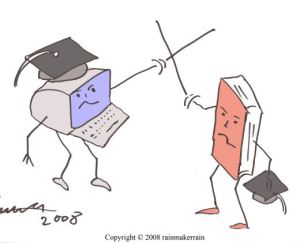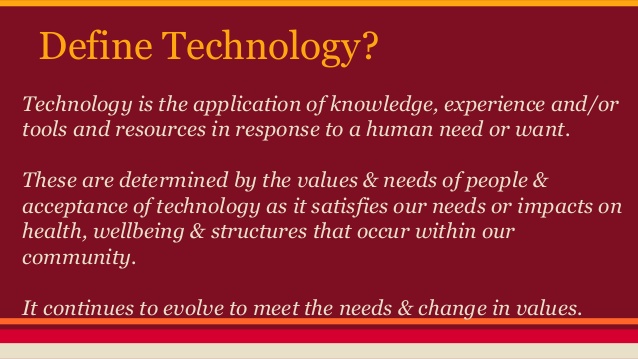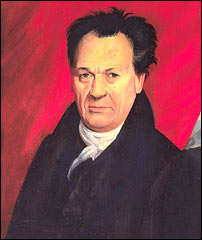
Challenge: manage
technology better
first we need to evaluate the potential consequences of technology
we need to understand the perspectives of different groups of people about that technology
this book focuses on a series of questions for evaluating technology
Preface: Nye wants us to think about how living in an intensely technological world affects our lives.
He is asking a series of questions about technology
technology is about being able to modify our environment, about choices
Can we define technology?
Since 1850 new technology has increasingly come from new discoveries in formal science. if you take that approach it speeds up technological progress and makes it more predictable.
Is this where all new technology comes from?
We can't say technology is unique to human beings as animals use it too
technology =
Along with the scientific and industrial revolutions (17th and 19th centuries, respectively) came a new respect for technology. New attitudes towards technology--that technology will make us rich and that "science and invention were the engines of progress" (p. 9)
from the scientific revolution until the late 19th century the relationship between science and technology is confused
what we call technology had been just something that craftspeople do, and the word as we use it today wasn't even used
now it began to be seen as a field of study, as something coherent and interesting
Consider the word: technology (used to mean only the scientific kind of technology, or at least the systematic study of tools, now we use it more broadly)
How is technology different from craft
The Oxford English Dictionary gives the following definitions:
1. a. A discourse or treatise on an art or arts; the scientific study of the practical or industrial arts.
3. In Greek: systematic treatment (of grammar, etc.), Obsolete. rare.
4. Special Combinations: technology assessment, the assessment of the effects on society of new technology; technology transfer, the transfer of new technology or advanced technological information from the developed to the less developed countries of the world.
Nye's point is that the word technology used to mean something very different
first meant only a book about practical arts, then came to mean the arts themselves
now it means scientific study of a practical art--practical arts were not very interesting to scholars
So what does "practical arts" mean?
Learning used to be divided up into:
Early American colleges taught prestige subjects--Latin, Greek, mathematics, philosophy and theology
But that still wasn't what we usually mean by technology today:

first we need to evaluate the potential consequences of technology
we need to understand the perspectives of different groups of people about that technology
this book focuses on a series of questions for evaluating technology
Preface: Nye wants us to think about how living in an intensely technological world affects our lives.
He is asking a series of questions about technology
- goal is not to ask questions about what we we should do
- goal is to define patterns that help you examine technologies
- his questions are tools you can use to consider how a technology will affect society
- that might be part of your job
- or it might be as a consumer choosing technologies
and as a citizen contributing to
public opinion
- executive order on safe, secure and trustworthy AI
- do we have choices? who makes the choices?
industry, government or consumers?
- possible approaches:
- trust industry to develop safe products
- require industry to show safety before something can be sold (we do this with new medications)
- wait for problems to arise and then regulate
- being able to see that the present situation could be
different--stories can have different endings
- seeing events in sequence
- seeing cause and effect in that sequence
- if I do this, that will happen
- consider different possible solutions or different
places to intervene
- remember what worked and teach others
- research shows that it is especially valuable in job
interviews to tell a story--when you leave the room the
story is still there.
- think about solving a problem as a story, not just
a solution
- Narrative medicine
- there isn't necessarily a best technology, it depends on what you want it to do for you
- narrative is a way you think about the larger patterns of the use of technology--context
- the past of a technology shapes its future
technology is about being able to modify our environment, about choices
Can we define technology?

Since 1850 new technology has increasingly come from new discoveries in formal science. if you take that approach it speeds up technological progress and makes it more predictable.
Is this where all new technology comes from?
- no, historically, before 1850 there was much less connection between formal science and technology
- today there are still new technologies that don't
arise from science, though they are less common/important
We can't say technology is unique to human beings as animals use it too
technology =
- tools that are made and are passed down socially
- ways of modifying our environment for practical
purposes
- being able to control nature (we aren't just a part of nature, we are trying to stand outside it and change it)
- if we distance ourselves too much for nature we can
see it as just there for us to exploit, and cause the
whole system harm
- Jane Goodall has shown that chimpanzees
use tools and orangutans
do also
- Nye argues that technology is part of human social development from the beginning
- tools helped shape early humans
- agriculture is a key turning point--new idea of controlling nature plus a greater division of labor--invented less than 10 thousand years ago in northern Iraq, and within a few thousand years independently in other parts of the world--China, India, central America. Slash and burn agriculture cannot support large populations--villages of 60 people or so.
- Irrigation and flood control were key to the development of cities because they support 14 times the population on the same area of land. A city of 3,000 or so requires organization and therefore the invention of writing

- labor demands increased as a result of technological advance, but it also allowed specialization--the invention of government, writing, and in general of civilization. This second revolution happened in Egypt and Mesopotamia about 3000 BCE and in Mexico around 600 BCE.
- population growth drives the need for new
technologies to get more from nature
- new technology makes possible more complex societies, more complex societies develop (for example because of more division of labor) more complex tools
- the driving force is being able to support
a larger population
- This meant the opportunities of a market, but at first opportunities to do new things were very limited by people's beliefs
- most societies are reluctant to take the
risks of doing things in new ways, so progress at first is
slow
- does this mean that technology inevitably shapes society in particular directions? Is it that technology inevitably develops according to a particular series of steps and leads to particular kinds of societies?
- Nye says no
- middle ages-new focus on progress, that
technology can make our lives better and easier
Along with the scientific and industrial revolutions (17th and 19th centuries, respectively) came a new respect for technology. New attitudes towards technology--that technology will make us rich and that "science and invention were the engines of progress" (p. 9)
from the scientific revolution until the late 19th century the relationship between science and technology is confused
what we call technology had been just something that craftspeople do, and the word as we use it today wasn't even used
now it began to be seen as a field of study, as something coherent and interesting
Consider the word: technology (used to mean only the scientific kind of technology, or at least the systematic study of tools, now we use it more broadly)
How is technology different from craft
The Oxford English Dictionary gives the following definitions:
1. a. A discourse or treatise on an art or arts; the scientific study of the practical or industrial arts.
b.
Practical arts collectively.
c.
A particular practical or industrial art.
d. "high-technology" applied to a firm, industry, etc., that produces or utilizes highly advanced and specialized technology, or to the products of such a firm. Similarly low-technology.
2. The terminology of
a particular art or subject; technical nomenclature. d. "high-technology" applied to a firm, industry, etc., that produces or utilizes highly advanced and specialized technology, or to the products of such a firm. Similarly low-technology.
3. In Greek: systematic treatment (of grammar, etc.), Obsolete. rare.
4. Special Combinations: technology assessment, the assessment of the effects on society of new technology; technology transfer, the transfer of new technology or advanced technological information from the developed to the less developed countries of the world.
Nye's point is that the word technology used to mean something very different
first meant only a book about practical arts, then came to mean the arts themselves
now it means scientific study of a practical art--practical arts were not very interesting to scholars
So what does "practical arts" mean?
Learning used to be divided up into:
- fine arts: painting, music, etc.--beauty for its
own sake, not practical
- liberal
arts: grammar, rhetoric, logic, arithmetic,
geometry, musical harmonics, and astronomy, to be
understood for their own sake rather than for
practical use
- practical arts: anything useful
Early American colleges taught prestige subjects--Latin, Greek, mathematics, philosophy and theology
But that still wasn't what we usually mean by technology today:
- Watch out for the idea that technology is the application of science--that was not true before the 18th century and only gradually became so over two centuries before about 1950. Even now, there are many technological innovations that don't involve formal science.
- Technology became the word for high prestige practical arts, it isn't so much used for low prestige ones (which is why technology today is sometimes used to mean computers--they have the highest prestige right now)
Two keys to technology becoming connected
to science in the second half of the 19th century
- improvements in science led to more useful knowledge
- people who develop technology began to
be trained in science (at colleges and universities)

Amos Eaton portrait from RPI
The history of Rensselaer
shows the process of making engineering into a formal
subject instead of simply the business of
craftspeople
- In England engineering was still
learned by apprenticeship until around 1900, while
France had developed a system of formal schooling in
engineering in the late eighteenth century.
The flagship school in France, Ecole
Polytechnique, taught a broad foundation of
mathematics and science with the idea that the
students would then go to specialized programs to
learn such fields as mining engineering and bridge
design.
- In the United States the Rensselaer School was founded in 1825, the first civilian technical school on the college level (the U.S. Military Academy at West Point was already teaching engineering). Stephen Van Rensselaer put up the money and Amos Eaton (1776-1842) provided the ideas and directed the new school.
- Eaton had started out as a lawyer and gone to jail accused of cheating in a land deal. While in jail he studied science by reading books. After he got out he made a living by giving public lectures about science.
- How does Eaton think you should teach science?
- you need hands on experience, not just to read a book
- students should give lecture-demonstrations to the professors
- learn practical scientific
knowledge, not just abstract knowledge
- Eaton stressed that students would learn science from its practical applications. At Rensselaer: "In every branch of learning, the pupil begins with its practical application; and is introduced to a knowledge of elementary principles, from time to time, as his progress requires. After visiting a bleaching factory, he returns to the laboratory and produced the chlorine gas and experiments upon it, until he is familiar with all the elementary principles appertaining to that curious substance." Eaton was struggling to figure out the relationship between science and engineering education. He was also a pioneer of hands-on education.
- Van Rensselaer wrote in 1824: "My principal object is, to qualify teachers for instructing the sons and daughters of Farmers and Mechanics, by lectures or otherwise, in the application of experimental chemistry, philosophy, and natural history, to agriculture, domestic economy, the arts and manufactures."
- one of the first colleges to adopt
Eaton's method was a women's college
- Rensselaer was reorganized to teach
more courses in engineering, particularly after Eaton
left in 1842. The trustees hired a
director, B.
Franklin Greene, who was committed to the French
model . This proved successful, and for twenty
years or so Rensselaer was the civilian equivalent of
West Point for training in civil engineering.
Engineering was becoming a specialized profession
- we can make the world a better place through
technology
- we do that not by trial and error but by systematic study
- science will give us power
- technology--the scientific study of practical matters--is the key to progress
- by the mid 19th century you had a new social understanding of what technology is and what it can do for us
This page written and
copyright Pamela E.
Mack
